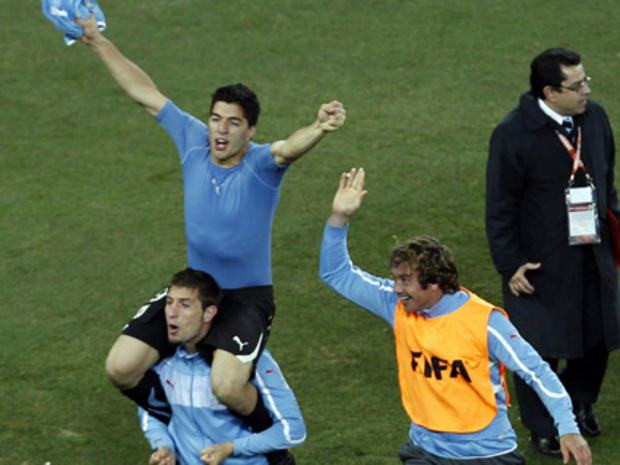World Cup Final 4: Holland, Germany, Spain and Ugly
Each of the World Cup quarterfinal matches had a pulse — and affected that of those watching. Each of the quarterfinals tested justice to the limit, and offered football without limits.
But only three of the quarterfinals produced teams that have something vibrant, something touching and something that has been overlooked by so many coaches: The art of the creative midfielder.
This species was not merely endangered. There are surely children on this Earth, in countries such as England and Uruguay, who have literally never seen one.
In days gone by, players like England's Paul Gascoigne and Glenn Hoddle, Italy's Roberto Baggio, Brazil's Zico, Argentina's Diego Maradona, and Romania's Georghe Hagi have graced international competition with their uncertain temperaments and their unpredictably beautiful technical ability.
Then they disappeared, to be replaced by large ants — players who ran around, flexing their considerable thighs, their vast lungs and the imagination of a real estate appraiser.
What is so uplifting about the fact that Spain, Holland and Germany are three of the last four is that each has a representative of all that is inspirational about the world's most beloved game.
For Spain, it is Andres Iniesta. He's barely bigger than Olga Korbut, but when a game is being squeezed into a stalemate of pawns, Iniesta comes along to glide through, just as he did against Paraguay, and set something up for one of his knights.
Iniesta isn't very loud. But you wouldn't expect a player who has been nicknamed "The Brain" and "The Illusionist" to let words speak louder than actions.
Iniesta's whole family worked in the Bar Lujan in a little village called Fuentealbilla, so he perhaps has some awareness of what real people expect of their national team.
Winning, yes! But winning with just a little joy, a little glory, a little unexpected panache helps the rioja glide more happily between the teeth.
Mesut Ozil, Germany's extraordinarily balanced creative force, also grew up amongst real people. Son of a Turkish immigrant, he was brought up in the mining town of Gelsenkirchen. Now that the mines are closed, Gelsenkirchen is one of Germany's biggest areas of unemployment.
However, the ease with which Ozil moves from one side of the pitch to another, the grace with which he commits his skill to the team, suggest nothing more than a certain artistic royalty, yet one which understands that people remember the electric far more often than the mundane.
For example, one Ozil left foot volley against Ghana will be remembered more than everything that Javier Mascherano contributed to this World Cup.
Ozil has played for his country fewer than 20 times. And it is painful to consider that, if it weren't for injury, Germany might have been lumbered with the leaden presence of Michael Ballack rather than this delightful talent.
Holland's creative delight is Wesley Sneijder, who respects the beauty of football because he comes from a footballing family. His father and two brothers were or are all professionals. And he came through the Ajax Footballing Academy, which produces highly opinionated artists and very few artisanal mechanics.
Like Iniesta, you could put him in your garden around the pond with all the other gnomes. Yet his touch and vision bring color to an Inter-Milan team that became dangerously functional and functionally dangerous under coach Jose Mourinho.
He even takes free-kicks with his right foot, while actually preferring to do most other things with his left.
That Sneijder, Ozil and Iniesta have emerged as three unearthed relics of a more pure creativity serves as an even greater contrast with the fourth semi-finalist, Uruguay.
Uruguay has scraped by teams with more talent, more verve and a little less fortune.
Though Luis Suarez and Diego Forlan have shown the understanding of a judge and his stenographer, Uruguay has largely relied on the dour, the drab and the shirt-grab.
In the past, unlikely countries that have burst into the semi-finals have enjoyed hopeful, engaging football. Think Croatia in 1998 or Turkey In 2002.
Uruguay plays the sort of workmanlike football than real workmen don't actually like watching. The team shamelessly celebrated Suarez's last-minute handball, which (though it shouldn't have) ensured their survival in the quarter-final against Ghana.
They could have accepted their good fortune with grace. Instead, Suarez left the field being hoisted on the back of a teammate, as if something had been won rather than lost.
One might call them overachievers. One might also call them Little Italy.
The joy of the cynic expressed to its fullest.
In truth, they do seem like nothing more than the fan who goes to a Nine Inch Nails concert, evades security and runs up on stage to sing twelve words with Trent Reznor, before being manhandled away.
Let's hope that the semi-finals are decided by creativity rather than negativity. It might offer a life lesson . . . as well as some much-needed lifeblood.
Chris Matyszczyk is an award-winning creative director who advises major corporations on content creation and marketing, and an avid sports fan. He is also the author of the popular CNET blog Technically Incorrect.
